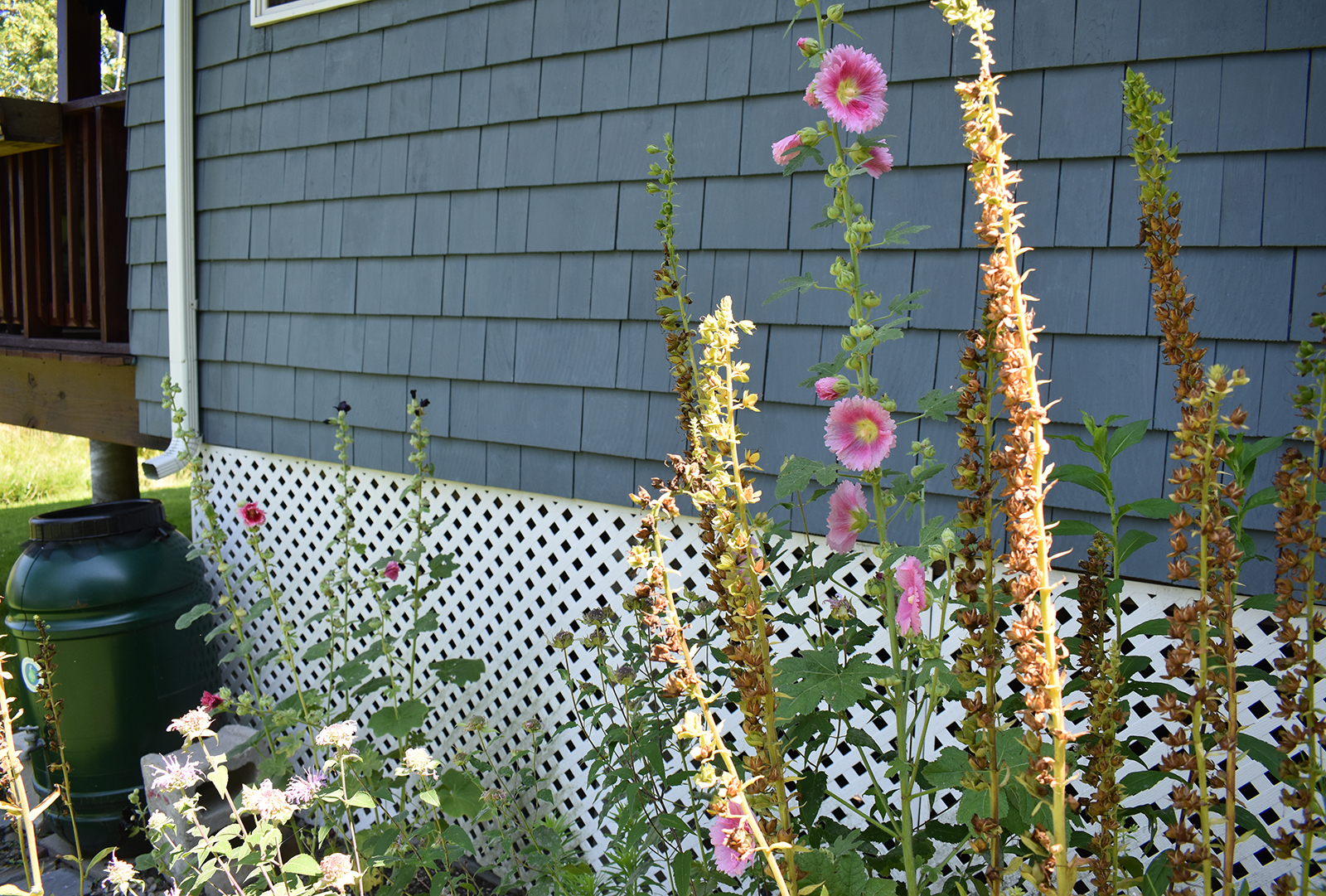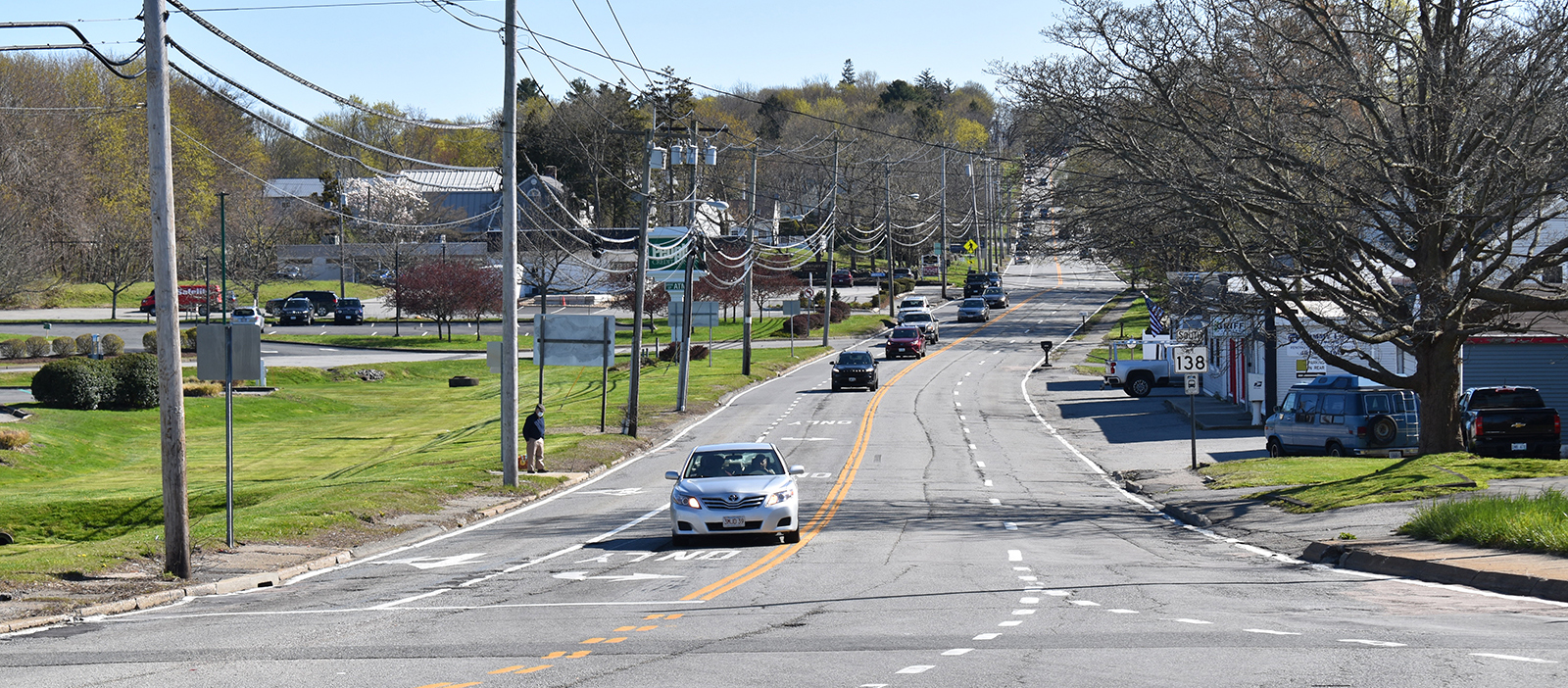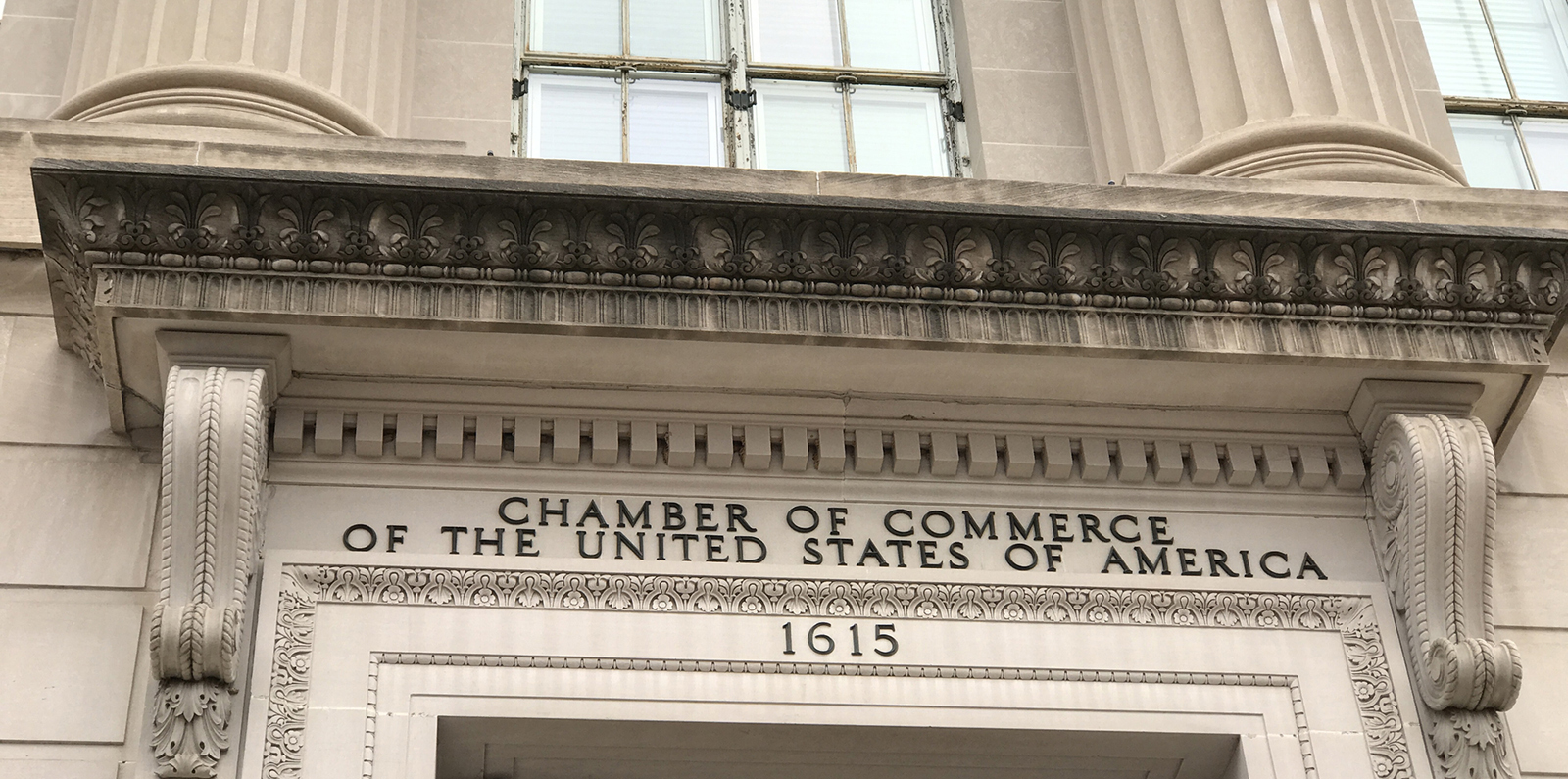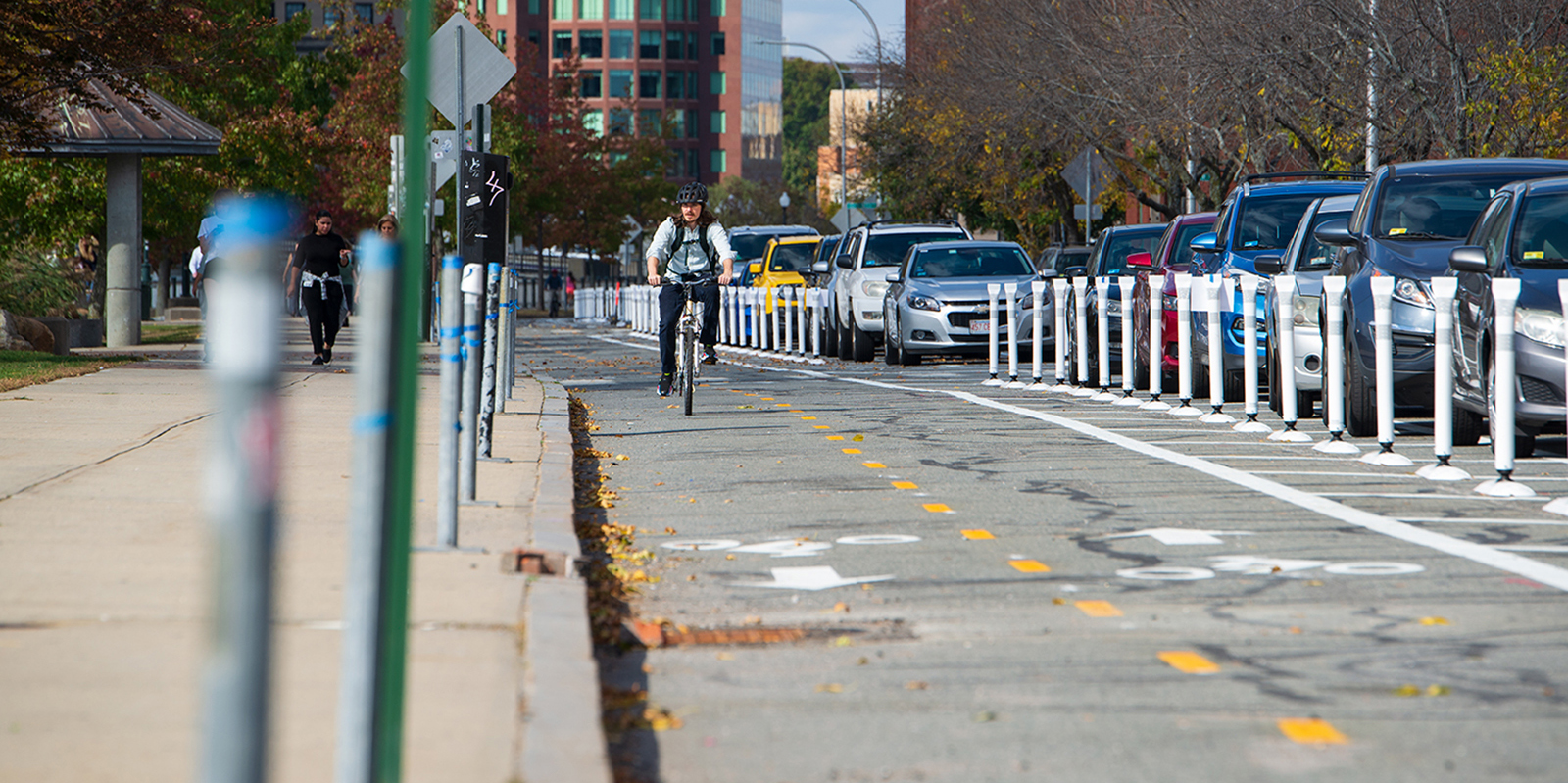Gas-Powered Leaf Blowers Need to Go
Lawn envy pollutes neighborhoods with noise and poisons
April 4, 2024
BRISTOL, R.I. — The roar of and the fine particulate matter spit from gasoline-powered leaf blowers and, to a somewhat lesser extent, lawn mowers forced George Voutes to move.
“It was the lawn stuff. Mostly leaf blowers that are incessant in every suburban town in America,” he said. “They’re just everywhere.”
After 22 years in Barrington, the northern New Jersey native recently moved a few towns over, leaving a neighborhood in the center of town with dense housing on quarter-acre lots to a more spacious area in Bristol not too far from downtown. He hopes the move lessens his daily intake of leaf-blower screech and pollution.
He realizes not everyone has the resources to (hopefully) move away from problems, whether big or small.
The Barrington neighborhood he lived in since 2011 echoed with the sound of “whaaaaa, whaaaaa” and other lawn-care equipment noise for much of the year. The machines’ poisonous emissions casting an almost-daily haze over the neighborhood.
The 60-year-old co-founded Quiet Clean RI to encourage the state and its 39 municipalities to transition away from gas-powered landscaping equipment. A 2023 petition Voutes started to stop the sale and use of gas-powered leaf blowers produced some awareness but otherwise didn’t move the needle at the Statehouse or the local town hall. Quiet Clean RI has launched another petition that asks the General Assembly to pass legislation to phase out the sale and use of gas-powered leaf blowers.
So far, such efforts have been a slow push, as neither the state nor any of its communities have done much to address the problem. Last year a bill filed in the House called the “Zero-Emission Lawn Care Devices Act” went nowhere.
The law, which would have mandated that all powered lawn and garden equipment sold in the state be electric by Jan. 1, 2025, and that all in-use equipment have zero emissions by Jan. 1, 2028, was opposed by the Outdoor Power Equipment Institute.
Purchasing trends in electric lawn-care equipment make H5549 and other legislative action unnecessary, according to testimony submitted by the Virginia-based trade association.
A 2021 ordinance introduced by a Providence City Council member would have prohibited the use of leaf blowers with an average sound level exceeding 65 decibels in residential zones, and prohibited the operation of leaf blowers throughout the city from 6 p.m.-9 a.m.
The lawn-care industry pushed back, claiming small landscaping companies would be put out of business, jobs would be lost, work production would decrease, the cost of landscaping services would climb, and the physical burden placed upon landscape workers would increase — all because less-powerful leaf blowers would be required in neighborhoods and none allowed before 9 a.m. and after 6 p.m.
In the summer, leaf blowers are mainly used to clear grass clippings off driveways, pavement, and concrete walkways — an absurd reason to pollute ourselves and the environment.
Voutes suggested banning gas-powered leaf blowers in late spring, the summer, and early fall when there are no leaves to be raked. (By the way, the more leaves left on your lawn or in your garden, the healthier your soil and the plants it feeds become.)
In February a House bill (H7495) named the “2025 Battery-Powered Leaf Blower Pilot Rebate and Education Program” was filed. The legislation would establish a pilot rebate program to be operated through the Office of Energy Resources for the purchase of battery-powered leaf blowers. The rebate program would be funded by an initial appropriation of $350,000.
About 100 municipalities nationwide have banned gas-powered leaf blowers or limited their use. In Massachusetts, Arlington, Belmont, Concord, and Lexington have voted to phase in year-round bans on gas-powered leaf blowers. Swampscott has decided to prohibit the machines from Memorial Day to Labor Day.
In Connecticut, Norwalk and Westport have passed ordinances to restrict fossil fuel-powered leaf blowers.
In 2021 California became the first state to ban all gasoline-powered lawn equipment, requiring new lawn mowers and leaf blowers to be zero-emission by this year.
The amount of air and noise pollution created to maintain lifeless outdoor carpets and leaf-free yards is a long-ignored public health issue and a mindless climate crisis exacerbator. Burning some 800 million gallons of gasoline every weekend to cut U.S. lawns is scary stupid.
Some gasoline-powered lawn and garden equipment — leaf blowers, lawn mowers, weed wackers, hedge trimmers — emit as much pollution in an hour as driving hundreds of miles in a car. Much of this pollution is generated in neighborhoods, where people live, play, and relax.
To help reduce the air and noise pollution from gas-powered leaf blowers in their Westerly neighborhood, Geoff Kaufman and his wife, Penny Parsekian, bought and donated an electric one to the caretaker of nearby Wilcox Park.
Kaufman said the caretaker was grateful, and he and his staff use the battery-powered one on occasion, but he was told gas-powered leaf blowers were required to collect leaves at the High Street park.
Whatever happened to using rakes?
Voutes and his allies want to remove fossil fuels from landscape maintenance, by promoting “quieter, cleaner, healthier landscaping alternatives” — from electric lawn-care equipment to replacing lawns with pollinator gardens to planting trees.
Landscapers would still be needed. They would just be working with less-polluting tools and doing more environmentally friendly work.
Voutes blames the machines, not the people operating them.
“I think that is a critical point. It’s the machines that we’re talking about. They’re used to make money and to do it quickly and as efficiently as possible,” he said. “The majority of us want to see these gas-powered leaf blowers and eventually gas-powered lawn equipment sunsetted and moved out. But it’s just such an ingrained behavior in American society. And I mean America, because the rest of the world doesn’t operate like this.”
Voutes discovered the deep unpleasantness of these machines when the pandemic changed how the corporate engineer worked.
“Working at home, it really became obvious that these things are terribly annoying and, more than that, they’re incredibly horrifying from an ecological perspective,” he said. “People have become accustomed to using these machines that blow the hell out of everything in existence and the awful pollution and noise that emits from these disruptive machines.”
He began researching the environmental impact the machines inflict when COVID forced lockdowns. He learned leaf blowers powered by gasoline are “epic polluters, given the antiquated design of the 2-stroke engine that mixes oil and gas, burning some of it and aerosolizing the rest.”
His research found our obsession with having a manicured lawn began soon after World War II.
“The search for the perfect landscape is at the root of why these machines are used so much,” Voutes said. “A perfect lawn is still considered a sign of success.”
Every weekend for much of the year, the roar of fossil fuel-powered lawn mowers, leaf blowers, and weed whackers belch pollution into the air. This unhealthy obsession with Norman Rockwell lawns is exemplified by one of my neighbors who mows his lawn every two days for most of the spring, summer, and fall. He had his customary earmuffs on — to block the noise, not the cold — during an early December spin on his riding mower that is more farm equipment than residential lawn care.
Those 800 million gallons of weekend spent fuel don’t include the gasoline and oil burned to mow lawns during the week or by landscaping companies. It’s just the amount used by about 54 million Americans to mow their lawns on Saturdays and Sundays. (My mowing-fanatic neighbor hits all seven days.)

Pollution from those millions of lawn-care machines accumulates. According to 2020 data from the Environmental Protection Agency, all of this fossil fuel-powered equipment emitted:
Nearly 22,000 tons of fine particulates — pollutants that have been linked to respiratory ailments, reproductive and mental health issues, and premature death. That is as much pollution as would be produced annually by 230 million average cars.
More than 68,000 tons of nitrogen oxides and 350,000 tons of volatile organic compounds — the two chemical components of ground-level ozone, which triggers asthma attacks and contributes to other health problems. Nitrogen oxide emissions from lawn-care equipment are equal to annual emissions from 30 million average cars.
More than 30 million tons of carbon dioxide, the leading cause of global warming, and a wide array of chemicals that cause cancer, including benzene and formaldehyde.
All of that air pollution in just one year of mowing, whacking, and blowing to manicure an outdated status symbol in a time off crisis.
“Grass doesn’t store any carbon, but a lot of our native pollinator plants have really deep roots and, like, trees store much more carbon,” Rhode Island Department of Environmental Management supervising biologist David Kalb said. “Your European grass does nothing for the native environment.”
All this fossil fuel-powered lawn-care equipment is also extremely noisy. Leaf blowers emit between 80 and 85 decibels, but cheap or mid-range ones can emit up to 112 decibels. Lawn mowers range from 82 to 90 decibels. Weed whackers can emit up 96 decibels of noise.
What is it going to take for people to realize replacing their lawns with native trees, shrubs, flowers, and ground cover is better for their health and the natural world? Maintained wild also provides the same benefits.
The Framingham, Mass-based Native Plant Trust defines “native” as plants growing in New England before European settlement. A yard with a diverse mixture of native vegetation is cheaper to maintain, easier to take care of, environmentally beneficial, and is more interesting.
Native plants also support native wildlife and insects, are better accustomed to the weather and soil, and are pest resistant. They support the pollinators of our food crops, clean the air and water, and help regulate the climate. They also make good natural buffers, which capture rainfall and filter stormwater runoff.
To create this type of easy-to-maintain, environmentally friendly habitat, buy native trees, shrubs, and plants from local nurseries that grow their own stock. It is important, according to native-first landscapers, to layer the different species, cluster the same ones together — it creates shelter for wildlife — choose plants that produce pollen and nectar, and have an equal percentage of evergreen and deciduous species.
Start making the change this spring to healthier yard choices.
Note: A great place for native plant information, advice, and plants is the Rhode Island Wild Plant Society.
Frank Carini can be reached at [email protected]. His opinions don’t reflect those of ecoRI News.




Thank you for this opinion piece. I completely agree. I have been driven crazy by all of the noise and particulate pollution from everyone’s lawn/landscaping services.
We literally don’t have one single day off. Seven days a week there is noise, noise and more noise. 🙁
Thanks for the excellent overview of yet another aspect of the foolishness of Americans’ affection for the nostalgia of the pseudo-farms we call lawns. The problem goes, as the article makes clear, so far beyond the noise all these things make–they do great harm.
Amen Frank. Thanks for continuing to
remind us on the dangers of fossil fuel lawn equipment and the many sensible (and much less harmful) ways to care for the land and natural world.
quietcleanri.org has a lot helpful information about transitioning away from gas lawn equipment, including example letters for helping smooth conversions between homeowners and contractors.
By the way, the city of Portland OR just passed a law transitioning away from gas powered leaf blowers. 80% of respondents favored the new law.
Hello, i totally agree. I try to use the rake for the main work and the (battery powered) blower i have to dust the driveway and walkway
i also make sure not to use it if people in my neighborhood are outside, or its dinnertime on weekends. i wish everyone could see how fast i can rake my leaves vs how long it takes with a blower. the small landscape companies would def require their workers to use them if they saw how much longer the blowers take to do the same job, and the fuel ($$) it requires to do so !!
leaf blowers are obnoxious, annoying, and insane. People are loath to protest them for fear of being tagged spoilsports, do-gooders, foes of ersatz workers and anti-gardeners. If it’s mechanical and loud, someone is “working.” Work is the highest virtue, and noisy work with these damnable machines is manlier than someone with a gentle rake and clippers, which is effeminate, i suppose, too Zen. Neighborhoods put up with this nonsense. Mustn’t interfere or rebuke. Tsk tsk.
I agree with Frank and all the others. If there are relevant hearings please let ecori readers know.
I’ll add that in the 1970s when Republicans still cared about the environment Congress passed a noise pollution control act with the EPA authorized to set standards, but in the 1980s President Regan defunded the office doing that and as far as I know it has never been revived. So we cannot expect any Federal help
I have been observing landscapers doing their spring clean ups recently. What I have seen is people walking around properties, 2-3 leaf blowers at a time, stirring up a lot of dust, and scouring a precious few leaves and twigs out of the lawn and shrubberies. On one occasion, there were 6 backpack blowers and 2 riding blowers, and almost no leaves. On another, they dusted the ground under cars in a parking lot. I don’t understand why people pay for this service, and it certainly does not jibe with industry protestations about how essential leaf blowers are.
Setting aside the necessity of dusting off parking lots in April, it is possible right now, with existing technology, to do so, and to maintain lawns, with battery-powered equipment. This is a service people in Rhode Island are looking for, but can not find. Several companies around the country are successfully using only electric equipment, but there are only 1 or 2 contractors in our entire state. Where are the companies stepping up to fill the niche? There is a federal rebate to help landscapers purchase electric mowers. Handheld tools pay for themselves very quickly, in savings of gas and maintenance. Why are RI businesses lagging behind on this trend? They say they are only doing what customers want, but are customers given an option? (I am thinking especially of those who can not care for their yard due to physical limitations.) Environmentally-aware customers of lawn care businesses should demand that they change how they operate.
I wholly agree that transforming lawns to more ecologically beneficial alternatives is ideal. I am a native plant enthusiast that has replaced my lawn with natives and edibles over many years. So I know that the process takes time and effort and ability. In the mean time, allowing a slightly shaggier look to a lawn, letting the violets, dandelions, sedges, and mosses commingle with the grass, and retiring the gas equipment are simple steps that will make a huge difference in our neighborhoods for wildlife and people.
Agreed. And, frankly, if being unable to use gas-powered leaf-blowers would put a lawn “care” company out of business, they probably aren’t long for the business anyway. We need fewer, smaller lawns anyway.
Thanks for laying out the facts on this doable issue of replacing gas powered equipment.
This is an important contribution individuals can make to decreasing air pollutants negatively affecting our environment.
We often look to government and big businesses to cut back on practices adding to climate change, but this is an important practice home owners, and any public or private entity with landscaped property can accomplish.
Moses Brown School in Providence is a great example of a community with a full-time grounds crew caring for a few acres of landscaped property switching from gas to battery powered blowers.
As a homeowner, one can switch to corded electric blowers, or a lawn care company using non-gas powered equipment and rakes.
I am guilty, I use a backpack blower during the fall only, after all the leaves have fallen. I try to limit it to cold days when windows won’t be open and people are less likely to be out & around.
I use one day at my primary residence and two days at my parent’s house as they are unable to and it’s use greatly optimizes my available time. Raking would take 9 hours at their place, where use of a blower takes 3 hours to complete.
I don’t use in the spring or summer and use a battery operated unit to blow off decks/walkways for 10 mins every other weekend. I rake all other places and hand clip dead growth during spring.
Agreeably, they are loud, emit fuel aerosols noticeably (even when properly tuned), but there power is irreplaceable.
As some of the other comments suggest, it is difficult to watch a landscape crew show up with 4 backpack blowers and go at every square inch of a property for an hour simply”blowing” to town!
Recognizing they are poor for our environment, I hope this challenges manufacturers to develop a cleaner solution, with matched power and can stand toe to toe with older gas tech.
Use a mulching mower, and the leaves are chopped to postage stamp size.
In addition to handheld and backpack gas leaf blowers are now wheeled leaf blowers and stand on blowers, at 165 mph, pulverizing the dirt and aerosolizing pollutants like chemicals and lead, arsenic..all for $$$
Thanks Frank!